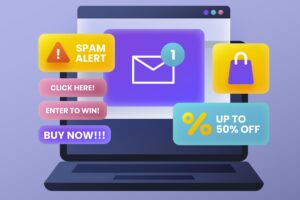
Source: Freepik
In the digital world, email accounts are a central part of our lives. If your email password has been compromised, it can have serious consequences: A hacked email account gives cybercriminals the opportunity to send phishing emails with fraudulent links to your family members, friends and addressees in your name.
In this article, you will learn how you can better protect your accounts and devices to prevent them from being compromised.
How Do Attackers Get My Login Details?
- phishing: fraudulent emails that trick you into revealing your login details.
- malware: malicious software that records your keystrokes or steals information.
- data leaks: hacked databases with user information.
- social engineering: deception through phone calls or other means of communication.
How Can I Better Secure My Accounts?
- use strong passwords: Combine upper and lower case letters, numbers and special characters.
- unique passwords: use a unique password for each account.
- two-factor authentication (2FA): Add an extra layer of security.
How Do I Choose and Manage Secure Passwords?
- use a password manager: Create and store strong, unique passwords.
- no personal information: Avoid personal information in your passwords.
- longer passwords: Use passwords with at least 12 characters.
What Should I Do if My Account Has Been Compromised?
- check devices for viruses: We recommend scanning with Sophos Antivirus and the free version of Malwarebytes
- change password immediately: Change the password of the affected account immediately.
- check security settings: Make sure 2FA is enabled and no unknown devices have access.
- notify contacts: Inform your contacts about the compromise.
- check accounts for suspicious activity: Make sure no unauthorized changes have been made.
- contact customer support: Seek help if you have difficulty restoring access. The IT ServiceDesk will be happy to answer any questions you may have.
What Should I Be Aware of to Ensure That My Accounts Are Not Compromised?
- be careful with suspicious emails: do not open any attachments and do not click on links in emails from unknown senders
- regular software updates: keep your operating system and applications up to date.
- use antivirus software: Install and update antivirus software regularly, such as Sophos Antivirus. Also available for smartphones.
- be careful with public networks: Avoid logging into sensitive networks via public Wi-Fi networks. If you use a public network, use the RWTH VPN with the full tunnel.
Conclusion
Keeping your email accounts and other online accounts secure is essential to protect your personal and professional data. Use strong passwords, enable two-factor authentication and watch out for suspicious activity to reduce the risk of compromise. If your account has been compromised, act quickly and follow the steps above to minimize the damage and restore your security.
Responsible for the content of this article is Maryam Hassani.





Uff, allein beim Lesen hatte ich schon das Bedürfnis, alle meine Passwörter zu ändern! Ich erinnere mich noch an den Schockmoment, als eine Freundin mir schrieb: ‘Hast du mir echt gerade einen Link zu günstigen Bitcoin-Investments geschickt?!’ – Spoiler: Natürlich nicht. Seitdem ist 2FA mein bester Freund. Super hilfreicher Beitrag, vor allem der Tipp mit den öffentlichen Netzwerken – den unterschätzt man oft!
Hallo Lisa,
Vielen Dank für dein Feedback! Es ist erschreckend, wie schnell so etwas passieren kann – ein kompromittiertes Konto kann weitreichende Folgen haben. 2FA ist definitiv eine der besten Maßnahmen, um sich zu schützen. Und ja, öffentliche Netzwerke bergen oft unterschätzte Risiken.
Schön zu hören, dass der Beitrag hilfreich war!
Viele Grüße
das IT Center Blog Team